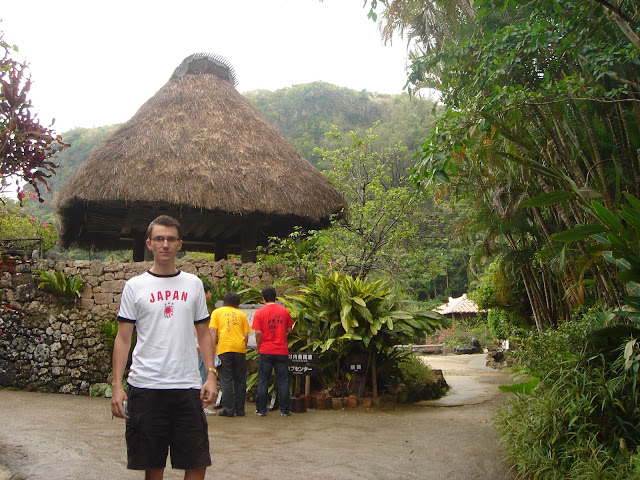Since this island is so small, we decided to do it again today but this time
go on a tour of the north. This was a much less sobering tour
than the one that we did yesterday given that it was more contemporary
and less focused on the tragic past of Okinawa. Our stops today
included of all things a pineapple farm and the world's second largest
aquarium - apparently second in size only to the Georgia Aquarium in
Atlanta.
The bus ride today was a longer one as we had to made
the snake-like journey up to the northern part of the island. This
could have been a boring experience but it turned out to be quite an
enlightening one as the tour guide provided a lot of commentary that
provided context on all of the places that we were about to visit. Of
interest during the journey was passing by (and through) the large U.S.
military bases that still cover the landscape of Okinawa. I could
comment on this in a politically sensitive manner but I will not go into
that here. I will say though that, although the bases no doubt serve
an important purpose for U.S. interests in the Far East, they are a
contemporary expression of the military tragedies of the past that have
befallen this beautiful island. If you want to get a more graphic and
political view of the impact of these bases, read "Sorrows of Empire" by
Chalmers Johnson.
Our first stop was at a re-creation of a
traditional Ryukyu village. Ryukyu (if I didn't mention it in my
previous entry) was the original name of the Okinawan archipelago (it
used to be known as the Ryukyu Kingdom which was a tributary state of
Imperial China). Although commercial in almost all respects, this
village was a very beautiful place to visit. We even saw numerous
examples of the local poisonous snake (the "Habu") as well as a
mongoose. Unfortunately there was no mongoose / snake fight today. I did
get to feed a large number of carp as well as a couple of very friendly
ducks that were living in the carp pond. It is amazing how sometimes
the simplest things can bring the greatest pleasure. I really enjoyed
feeding those animals.
We then proceeded to the ocean and a cliff-filled area known as Manza-mo. There were some spectacular sights here. It was a very windy and rainy day but this did not dull the spectacular view. No wonder this was a favourite place of Ryukyu kings.
The
Churaumi Aquarium was indeed a sight to behold. I've been to a couple
of other aquariums (most notably the Vancouver Aquarium and the New
England Aquarium in Boston) but this place definitely took the cake.
Not only was there a good dolphin and whale show but the massive
shark / ray / tuna / whatever-else-kind-of-fish-you-can-imagine tank was
unbelievable. Apparently the main viewing area houses one of the
largest single panes of plexi-glass in the world. There are a several
pictures that I've posted here that should illustrate the scale of this
tank. Truly extraordinary.
Our last stop of the day was at the Nago Pineapple farm. Pineapple and sugar cane used to be a couple of important cash crops here in Okinawa but, due to competition from lower cost suppliers in the third world, are primarily grown today for the benefit of the tourism industry. It was interesting to learn more about pineapple (I guess that I could have simply looked this up on Wikipedia but definitely more interesting to learn in person!). Each plant only produces one pineapple and it takes around 2 years for the fruit to ripen. No wonder it's difficult to compete with low-cost producers. I also did not realize that there were so many applications for pineapple - from cakes, to wine, to vinegar. For those of you that have been to Hawaii, this is probably not a revelation. For me though, it was interesting.
Today is our last day in Okinawa and it is with
mixed emotions that we leave. On the one hand, this is a very beautiful
place with friendly people and very nice, warm weather. The culture
here is indeed more laid-back and is noticeably different from the
mainland. People just act different here, yet it is still Japan. On the
other hand, this is a somewhat sad place where the weight of history
and the hideous events of nearly a century ago still linger in the
hearts and minds of the inhabitants. In addition, the resentment over
the continued U.S. military presence by the locals was very evident
everywhere that we went.
We will miss Okinawa and hope that
perhaps someday we can return to visit again. It was well worth it to
make the trip down to this place not only for the warm weather and the
friendly people but also to learn that, where we come from in Canada, we
haven't known (and hopefully will not know anytime soon) the horrors
that the ancestors of the people we visited experienced and still feel
the pain from today.


































Comments
Post a Comment